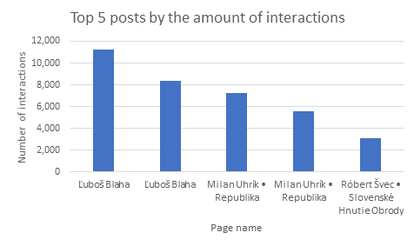Disinformation
Infosecurity.sk: Bi-Weekly Report on Emerging Disinformation Trends (June 3, 2021)

Project Infosecurity.sk organised by STRATPOL – Strategic Policy Institute and Slovak Security Policy Institute, supported by the Prague office of Friedrich Naumann Foundation for Freedom, continuously monitors the activities of both Slovak and foreign disinformation actors but focuses mainly on the former. The project activities are built upon daily monitoring of emerging disinformation, hoaxes, and conspiracy theories in the online information space. That allows the analysts to identify disinformation posts and narratives that resonated with the public the most, as well as to find out where they originated, and how they spread and evolved on social media. This report represents a bi-weekly summary of arising trends in the spread of malicious information content online. Based on that, Infosecurity.sk can warn the public about emerging and current trends in the field of disinformation, manipulation, and propaganda.
This week, as in previous weeks, Infosecurity.sk presents an overview of disinformation trends it has been able to capture over the past two weeks:
1. Regarding the interception of the Ryanair flight and the subsequent arrest of a Belarusian dissident journalist Roman Protasevich, local disinformation actors actively follow the narratives spread by the pro-Lukashenko media.
2. The disinformation actors launched a smear campaign against Roman Protasevich to suppress any sympathy for the detained journalist.
3. The disinformation media also actively try to downplay the significant violation of international law by shifting the blame on the West.
4. Disinformation actors take every opportunity to spread anti-vaccination narratives and polarise the public, not shying away from using a person's tragic death to further their agenda.
Snatching of the Belarussian dissident
As evident from our earlier reports, many disinformation actors are closely monitoring breaking news and stories to quickly identify those who share information that contradicts their pro-Russian narratives, and which could harm the public image of Moscow and its allies. In such cases, the disinformation media quickly respond by flooding the information space with disinformation counter-narratives aimed at mitigating the negative impact and deflecting the blame from Russia as well as its allies.
A recent example of such news is the arrest of Belarusian opposition blogger and journalist Roman Protasevich and his female companion, Sofia Sapega who is a Russian citizen. Protasevich was on-board a Ryanair flight from Athens to Vilnius when the civilian plane was intercepted by a Belarussian fighter jet and forced to change the course and make an emergency landing in Minsk where both Protasevich and Sapega were subsequently arrested. The arrest took place only two days after another anti-government activist, Vitold Ashurak, died in prison.
Belarusian authorities justified the actions by claiming that the Minsk airport received an alleged email from the Palestinian militant group Hamas according to which a bomb had been planted aboard the flight. Nonetheless, Hamas spokesman Fawzi Barhom was quick to refute the allegations as fictional. According to the available information, the e-mail announcing the bomb came almost 30 minutes after the pilot of the plane was asked to land in Minsk.
Protasevich, 26, belongs to a group of journalists who have informed about the violence used against journalists and opposition activists by forces loyal to Belorussia's long-time President Alexander Lukashenko. Protasevich, through his Telegram channel Nexta, also closely covered the mass protests sparked by the last year's presidential elections, which are widely considered as being rigged by Lukashenko. Protasevich, therefore, posed a threat to Lukashenko regime, landing him a spot on the Belarusian KGB's official terrorist list.
The day after his arrest, Protasevich appeared in a confessional video, stating that he was being well treated by the Belarussian authorities and was cooperating in an investigation of organising "mass unrest" in Minsk, prompting speculations that the confession was made under pressure. According to some sources, Protasevich may face the death penalty; other sources claim that he faces fifteen years' imprisonment for the alleged support of terrorist groups in Belarus.
Lukashenko's actions triggered a wave of condemnation and criticism from the EU member states as well as much of the western world. Some state officials even described it as an "act of state terrorism" that cannot remain unpunished. The Slovak foreign minister, Ivan Korčok, strongly condemned the arrest as a politically motivated act masked as a counter-terrorist action and requested for the "immediate release of the aircraft and all its passengers, including those which were illegally detained."
The negative response towards Lukashenko's actions triggered a reaction from the disinformation actors, who were quick to side with the Belarussian regime. A relentless smear campaign against Protasevich ensued, aimed to stamp out any feelings of sympathy the public may have for the jailed journalist. Several different disinformation narratives rapidly proliferated on the internet, most of which claimed that Protasevich was a "western agent" and a "pro-Brussel Nazi".
The pro-Lukashenko press has tried to portray Protasevich as a right-wing extremist, claiming that Protasevich was a mercenary fighting in the Ukrainian Azov battalion, consisting of right-wing extremists and Nazi sympathisers based in Mariupol in the Azov Sea coastal region. Pictures of a member of the Azov battalion “resembling” Protasevich are cited as evidence. Although Protasevich has confirmed that he spent a year documenting the Ukraine conflict as a journalist, neither the pictures nor the claim of his involvement with the Azov battalion have been independently verified.
Nevertheless, the local disinformation media followed the narratives spread by the pro-Lukashenko press. The Slovak disinformation website Zem a Vek claimed that Protasevich was a member of the battalion Ukrainian Azov. Other disinformation websites published pictures of various people (most of whom bore little resemblance to Protasevich) displaying the Nazi salute and claiming that it was indeed Protasevich.
Although the interception of the flight was a gross violation of international law, the pro-Russian media have generally tried to downplay its seriousness. The published articles have praised Lukashenko's response, quoting Russian Foreign Minister Sergey Lavrov and the president of the International Association of veterans of the Russian Anti-Terrorist Unit "Alpha", both praising his actions, the latter even calling it a "remarkable operation."
Particularly heavily cited by the local pro-Russian media was the Facebook post of Slovakia's leading pro-Kremlin governmental politician, Ľuboš Blaha. Blaha's post claimed that the interception of the flight was a "hoax" and that the plane landed at the pilot's request, citing the aforementioned unconfirmed Hamas bomb threat as the reason.
Blaha's attempts to refute the criticisms of the Lukashenko regime serve as a prime example of "whataboutism", a logical fallacy that seeks to discredit an opponent's position by accusing him of hypocrisy without directly refuting or rebutting his argument. In this way, Blaha tried to spin the story around with his traditional anti-EU and anti-Western narratives, claiming that the news about the case put forward by the "liberal" media was nothing more than conspiracies.
Nonetheless, as was the case in the past, his disinformation posts were able to attract the public's attention. Taking a closer look at the top 5 posts informing about the case, which scored the highest number of interactions (reactions, comments, and shares) in the last two weeks, we can see that the most popular posts come from disinformation actors.
The data was gathered by searching for the keyword "Bielorusko" (Belarus). We used our extensive list of disinformation outlets, traditional media, and politicians.

The first two posts, which scored the highest number of interactions, came from the aforementioned pro-Kremlin politician Ľuboš Blaha. The other two posts are from MEP Milan Uhrík, a former member of the extremist right-wing party LSNS who recently founded his own political party called Republika. Like the others in the chart, his posts praised Lukashenko's actions and claimed that he and his party would not support any sanctions against Belarus or Russia. In fifth place there is a post by Róbet Švec, the head of the non-parliamentary political movement Slovenské Hnutie Obrody, known for his pro-Russian and anti-Western views. We can observe that the topic has united extremists from both sides of the political spectrum and that disinformation actors continue to dominate Facebook.
Anti-vaccination narratives continue
In addition to keeping up with the latest news and stories, the disinformation actors also stick to their traditional topics including Covid-19 and anti-vaccination narratives. The passing of a popular Slovak presenter Julo Viršík at the age of 56 due to cardiac arrest, who was recently vaccinated with AstraZeneca's vaccine, served as a pretext for the renewed spread of anti-vax narratives by the disinformation media.
Although the link between the vaccination and the presenter's death has been officially ruled out, the Slovak disinformation scene used the sudden death to undermine the public's confidence in the vaccination process. The Slovak disinformation website InfoVojna quickly drew and subsequently overemphasised the links between vaccination and the presenters' sudden passing. Extremist politicians also used the sad news to push their anti-establishment agenda.
Marian Kotleba, the head of the far-right parliamentarian party ĽSNS, used it as an opportunity to attack the "liberal" media. Kotleba claimed that when his close friend and Catholic priest Miroslav Čajka, who denied the existence of Covid-19, passed away due to the virus, liberals were "laughing", but when a "prominent liberal presenter dies just days after being vaccinated, liberals and the media are silent."
It is apparent that the disinformation actors utilise every opportunity they have to spread anti-vaccination narratives and polarise the public. As evident in this case, they don't even shy away from using a person's tragic passing in the process.
Matej Spišák is a Research Fellow at STRATPOL – Strategic Policy Institute in Bratislava and Editor-in-Chief at Infosecurity.sk.
Denis Takács is an Analyst at STRATPOL – Strategic Policy Institute in Bratislava.

